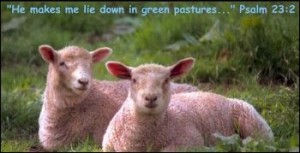In Jack Hayford’s notes on the Song of Solomon, he says, “The Song contains portraits of the Shulamite woman along with a full array of her garden products. These should be taken both as poetic parallels of marital love and as covenant  blessings of the people in their land.” I think he is right. One passage in the book gives clear directions on how to experience the covenant blessings of God. Song of Solomon 1:8 says, “If you do not know, O most beautiful among women, follow in the tracks of the flock, and pasture your young goats beside the shepherds’ tents.” Many commentators have observed that the Hebrew word for “tracks” is actually “heel prints.” It might be a subtle reference to Jacob, the heel grabber. One commentator observes, “Jacob’s shepherd role and his lifelong struggle for the blessing of God and man are cited as the biblical norm for God’s people (Hos. 12:3–6, 12, 13). He was born grasping his brother’s heel, a congenital manipulator. He was “disjointed” with deception at the core of his being as illustrated by his limp at Mahanaim (Gen. 32). He was forced to live outside the land under the threat of an angry brother. He returned to the land after twenty years with a faulty family foundation. Deception, lack of love, jealousy, anger, and love for hire (for mandrakes) went into the shaky substructure. The very names of the Twelve Tribes show the need for a new family history.”
blessings of the people in their land.” I think he is right. One passage in the book gives clear directions on how to experience the covenant blessings of God. Song of Solomon 1:8 says, “If you do not know, O most beautiful among women, follow in the tracks of the flock, and pasture your young goats beside the shepherds’ tents.” Many commentators have observed that the Hebrew word for “tracks” is actually “heel prints.” It might be a subtle reference to Jacob, the heel grabber. One commentator observes, “Jacob’s shepherd role and his lifelong struggle for the blessing of God and man are cited as the biblical norm for God’s people (Hos. 12:3–6, 12, 13). He was born grasping his brother’s heel, a congenital manipulator. He was “disjointed” with deception at the core of his being as illustrated by his limp at Mahanaim (Gen. 32). He was forced to live outside the land under the threat of an angry brother. He returned to the land after twenty years with a faulty family foundation. Deception, lack of love, jealousy, anger, and love for hire (for mandrakes) went into the shaky substructure. The very names of the Twelve Tribes show the need for a new family history.”
It’s interesting to observe that in the Song of Solomon, the Shulamite presents a profound contrast to Jacob. In Mahanaim, instead of limping, she does a dance (see 6:13 compared to Genesis 32:2). In Jacob’s history, his dysfunctional family, established by the competitive nature of the four mothers of his 12 children, is reversed by the Shulamite. When she finds the one she loves she holds on to him and won’t let go. In 7:11-13 we read of fragrant mandrakes that grow in her fields. When the daughters of Israel see her they pronounce her blessed and happy. According to 7:13 she bears “pleasant fruit” which symbolizes the fulfillment of God’s promises to His covenant people living in the land of Promise. The foundation for a fully functional, healthy, happy family is found in the covenant promises of God. When we “follow in the tracks of the flock” we find still waters, green pastures, joy, peace and contentment in our homes and families.
On one of our trips to Israel we were on the bus traveling from one site to the next when one in our company asked the guide what those lines were that ascended up the hills and mountains in the distance. The tour guide explained those lines as being the paths of righteousness. They are the trails that the sheep have cut as they ascended the mountain for pasture. Sheep that wonder off those trails often found themselves in danger and lose their footing or get tangled in the brush and have to be rescued. The phrase “paths of righteousness” are frequently referred to in the Bible as the ways of God as explained in scripture. As we follow in these paths, we escape the dangers to our souls and to our families.